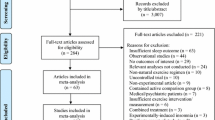Abstract
This is the first nation-wide face-to-face survey on the prevalence of well-defined severe insomnia and its impact on quality of life in the general population of Germany. The survey was part of an international epidemiological study, which was also conducted in Belgium, Great Britain, Ireland and Sweden. A representative sample of 1913 adults aged 18 years and over were interviewed in all parts of Germany according to the quota method. Subjects with symptomatic insomnia were identified using an algorithm compatible with the principal criteria for severe insomnia defined in the fourth revision of the Diagnostic and Statistical Manual of Mental Diseases (DSM-IV). Subjects provided data on quality of life using the Short Form 36 Health Survey (SF-36) questionnaire and on health care consumption.
Prevalence of severe insomnia in Germany was found to be 4 %, which was lower than in other European countries (6–22 %). Severe insomnia was more prevalent among women, the unemployed, those living alone after divorce or separation, and those in large cities, but not more frequently in the elderly (aged 65 years and over). The majority of subjects had chronic complaints, with 74 % of them suffering from severe sleep problems for over a year's duration (average 56 ± 23 months). Consultations with general physicians, medication usage, medical tests and hospitalisation were greater among severe insomniacs compared to subjects who had no sleep complaints. The question regarding overall appreciation of quality of life was rated as bad in 22 % and good in 28 % of severe insomniacs compared to 3 % (bad) and 68 % (good) in subjects with no sleep complaints. Despite this, only 55 % of severe insomniacs had ever discussed their sleep problem with a doctor and the proportion who consulted their doctor specifically regarding sleep problems in the previous 12 months was even lower (36 %). The vast majority (73 %) was not taking hypnotic or sedative medications.
In conclusion, insomnia, even when severe, is a common and a chronic complaint in Germany. This trial suggests that while, on the one hand, sleep disorders have a significant impact on patient's quality of life and consumption of health care, it is, on the other hand, a condition that is poorly recognised and for which patients are, for unknown reasons, reluctant to seek treatment.
Similar content being viewed by others
Author information
Authors and Affiliations
Consortia
Additional information
Received: 23 November 1999 / Accepted: 23 August 2000
Rights and permissions
About this article
Cite this article
Hajak, G., on behalf of the SINE Study Group. Epidemiology of severe insomnia and its consequences in Germany. European Archives of Psychiatry and Clinical Neurosciences 251, 49–56 (2001). https://doi.org/10.1007/s004060170052
Issue Date:
DOI: https://doi.org/10.1007/s004060170052



